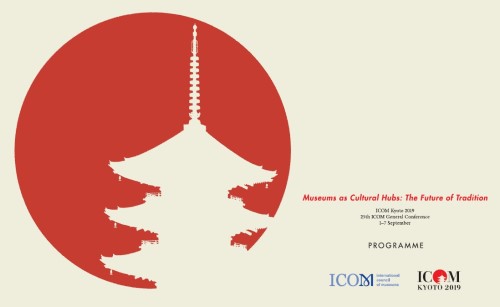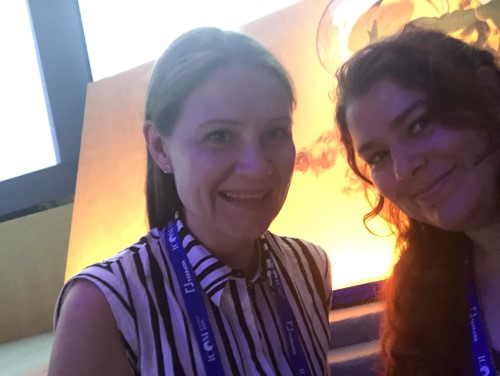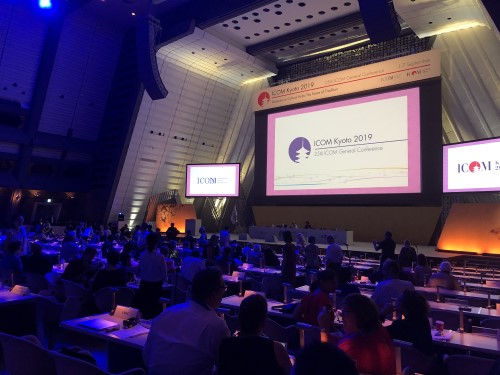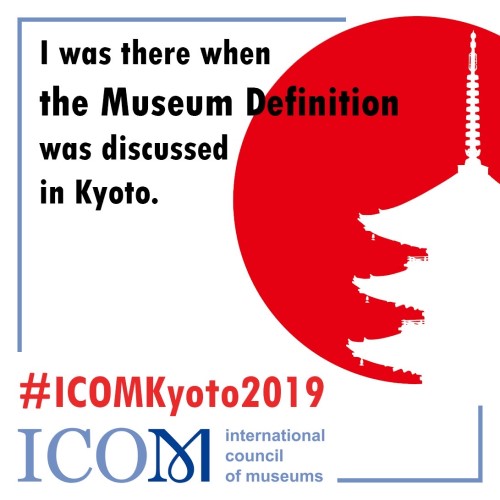At the start of September, I was on a plane from Amsterdam to Kyoto, already networking with rows of fellow Dutch delegates attending the ICOM Triennial Conference. The conference was in the news in Japan every day. Even internationally, the conference was picked up by the news because of a huge debate that erupted: was ICOM going to change its definition of ‘the museum’?

ICOM is the International Council of Museums. The organization was founded in Paris in 1946 and today works to support museums and their staff around the globe. As of 2018, ICOM has 44,686 members, most of whom are individuals working in museums or researching museums. On a global level, ICOM is involved in work and conversations related to museums and their collections. For museum professionals, the ICOM Code of Ethics is a guiding document used by many museum institutions which provides information for instance on how to ethically acquire new collections, or what to do with unwanted objects. ICOM’s Red Lists of cultural objects at risk are practical tools to curb the illicit traffic of cultural objects and are used among others by customs officials and police. Perhaps best known to the public is ICOM’s annual event: International Museum Day. IMD is held on May 18th and is celebrated with special events and activities in tens of thousands of museums around the world.
Every three years, ICOM holds a major conference. This triennial conference, under the theme ‘Museums as Cultural Hubs: The Future of Tradition,’ was organized by ICOM Japan and held in Kyoto on 1-7 September 2019. The program was packed with formal meetings of councils and committees, keynote lectures, plenary sessions, and workshops. There were social events nearly every evening held at Kyoto museums or heritage venues. Over several days, ICOM’s 30 International Committees each held parallel sessions. Alongside the conference, a large museum expo was held in three halls of the Kyoto International Conference Centre. The conference had over 5000 participants.

For ECHOES, Magdalena Wróblewska and I attended from Work Package 3. I presented in a session organized by CAMOC, the International Committee for the Collections and Activities of Museums of Cities. As the session consisted of 5-minute lightning talks, I decided to focus on presenting a few examples of decolonial practices that museums employ to deal with colonial pasts and legacies. The examples were mainly from my research at the Amsterdam Museum, including a couple from Europe and the Caribbean. You can find the presentation here. During the conference, Magda and I kept our ears open for other examples of decolonial practices from around the world. We are beginning to work on a book, to be published jointly by the Amsterdam Museum and the Museum of Warsaw, which will present practical examples of decolonial approaches for museum practitioners.
At the ICOM Triennial, the topic of decolonizing museums was the focus of one of the plenary sessions and came up in many presentations and panels. It is clear that museums around the world are in various ways facing the colonial roots of the modern museum institution, as well as the specific colonial legacies and histories in their local or national contexts. Although there is still much work to be done, museum professionals are highly aware of this issue. My talk on decolonial practices aligned neatly with presentations from the Museum of New York, the Western Australian Museum, and others. Another major conversation at the conference was the planetary crisis in terms of climate change and the need for museums to focus on sustainability. How can museums provide visitors with information about climate change, while becoming more sustainable institutions themselves? Delegates were quick to reflect on themselves and the conference, wondering about the sustainability of such a major international meeting and the impact on the environment.
However, the biggest debate was about the definition of the museum. We all have a feeling about what museums are, what they can be, and what they are not, but as part of its Code of Ethics, ICOM provides a formal definition of the term. In many countries in the world, this museum definition is hugely important. In some places it is included in heritage legislation, elsewhere it forms the basis of national museum associations and determines who can be a member, or it may be used to determine who is eligible for cultural funding. Perhaps you might be surprised to learn that the first definition from 1946 includes zoos and botanical gardens, but excludes libraries. ICOM has been working on a new definition since its last Triennial in 2016 through a collaborative process. Over 250 suggestions for a new definition were received from the public and distilled by the working group. In Kyoto, the General Assembly was asked for vote on a proposed new definition:
“Museums are democratising, inclusive and polyphonic spaces for critical dialogue about the pasts and the futures. Acknowledging and addressing the conflicts and challenges of the present, they hold artefacts and specimens in trust for society, safeguard diverse memories for future generations and guarantee equal rights and equal access to heritage for all people.
Museums are not for profit. They are participatory and transparent, and work in active partnership with and for diverse communities to collect, preserve, research, interpret, exhibit, and enhance understandings of the world, aiming to contribute to human dignity and social justice, global equality and planetary wellbeing.”

Most of the conference participants were pleased with the general intention and meaning of the proposed new definition and were happy to see that it creates a strong role for museums to be active parts of contemporary society. However, even though they were happy with the message, almost everyone felt that it was not a definition. Perhaps it was more of a vision statement, or a mission, or a roadmap, or even goals such as the Strategic Development Goals. Delegates were worried that changing the definition to this text would lead to legal, political, and practical issues. Would defining museums as ‘democratising spaces’ play into the hands of politicians who could then dismiss museums as anti-state and withdraw their financial support? Or would it protect museum institutions who might have anti-governmental narratives? Could such a definition be enforced in matters of cultural heritage laws? Part of the membership called for a postponement on the vote. Others argued the vote was on the agenda and needed to take place. I was present in the room to vote on behalf of the Museums Association of the Caribbean and I had been torn on how to vote. Yes, I felt that the definition was of relevance to many museums in the Caribbean. I could envision how it might protect and strengthen some institutions, although it might jeopardize others. I would have liked to vote “yes for the text as a vision statement” but to develop a more general, single-sentence definition. But would it be wise to vote “yes,” changing the statues of ICOM and impacting legislation beyond what I could oversee, just to support the sentiment of the definition?
In the end, it became clear that a vote on the definition would never pass as it needed a two-thirds majority. Instead, the President of ICOM and chair of the Extraordinary General Assembly opted to vote whether to postpone a decision on the definition until at most the next ICOM General Assembly, next year in Paris. The vote to postpone passed. With that, the working group for the new definition can get back to work.

And what now? The working group will get back to working on the definition, but will definitely need more help from ICOM and its members. Now is the time to join the debate. A good starting point might be reading the issue of Museum International devoted to the museum definition. If you are already a member of ICOM, you can consider joining an International Committee or becoming more active in your National Committee to be part of the discussion moving forward. And from the perspective of decolonizing the museum? Inclusivity will be an important part of redefining the museum definition. Now is the time to start working towards making sure that the voting process next year in Paris will be as inclusive and representative as possible. This is a challenge for ICOM, an organization with 80% of its membership in Europe. European ICOM members should work to create space at the table, to invite more non-European museum professionals to join ICOM, and to ensure that ICOM members from outside of Europe are able to attend the vote. And of course, all members with a voice and with a vote can take this year to carefully consider the museum definition from the perspective of decolonization.
Author: Dr Csilla Ariese
